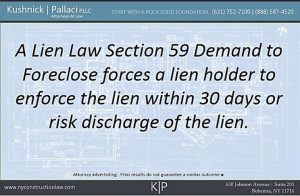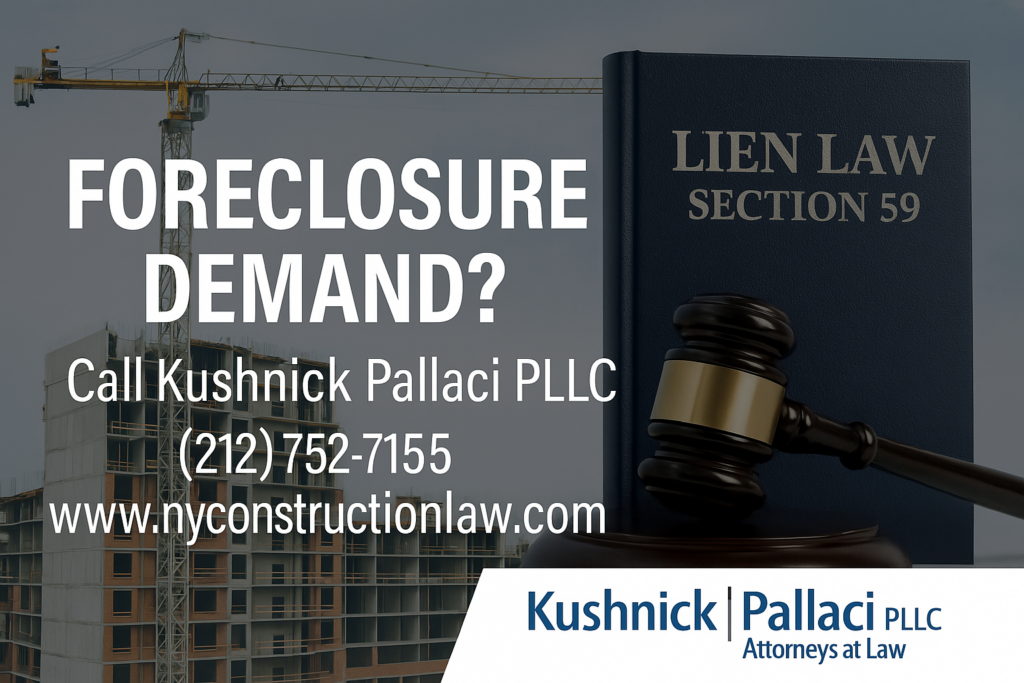
When a property owner receives a mechanic’s lien the first question they ask is usually “how do I get rid of this lien?” Well if the mechanic’s lien is “valid on its face” and you want to challenge the validity of the lien then you need the person that filed the lien to foreclose on it. Foreclosing on a mechanic’s lien is a term used to refer to the lawsuit commenced by a lienor to enforce its mechanic’s lien. Probably the most common part of a mechanic’s lien that a property owner wants to challenge is the amount claimed due. Either the property owner believes that nothing is due and the mechanic’s lien never should have been filed or the property owner thinks that less (sometimes much less) is due than is set forth in the lien. However, even if you think you have proof that the amount claimed due is incorrect, that does not constitute a “facial defect” (see Lien Law Section 19) so you are left forcing the lienor to enforce the lien and foreclose so that you can challenge it based upon the incorrect amount claimed as due and owing.
So how do you force a lienor to foreclose on its mechanic’s lien? New York Lien Law Section 59 provides you with the answer. The statute allows the property owner, or even the general contractor, to serve a written demand on the lienor demanding that the lienor either foreclose on its mechanic’s lien within 30 days of being served with the demand or show cause before a court why the lien should not be vacated. This demand is often referred to as the Lien Law Section 59 Demand to Foreclose. The statute is very specific as to the process for serving the Lien Law Section 59 Demand to Foreclose and the timing issues are crucial so we strongly suggest that you consult a construction attorney to help you with the process. Essentially, once properly served with the Demand to Foreclose pursuant to Lien Law Section 59, the lienor has 30 days to commence foreclosure proceedings. If the lienor fails to do so then you can commence a special proceeding and seek to discharge the mechanic’s lien for the lienor’s failure to timely foreclose. The demand really forces the lienor to address the lien rather than allowing it to sit against the property for 1 year (the life span of a lien). If the lienor ignores your Lien Law Section 59 Demand to Foreclose then you will likely be able to have the lien discharged through a Lien Law Section 59 special proceeding. If the lienor actually forecloses then you have your avenue to challenge the underlying validity of the mechanic’s lien.
Remember, if you can prove that a lienor intentionally and willfully exaggerated a mechanic’s lien then, under Lien Law Section 39-A, you can have the entire mechanic’s lien voided and recover damages against the lienor for the amount of the exaggeration plus, in some situations, attorneys’ fees.
The attorneys at Kushnick Pallaci regularly prepare Lien Law Section 59 Demands to Foreclose and prosecute and defend special proceedings under Lien Law Section 59. You can read more about our Lien Law Section 59 practice here. If you want to use Section 59 to challenge a mechanic’s lien or have received a Lien Law Section 59 Demand to foreclose and want to discuss it further, you an contact us here.

